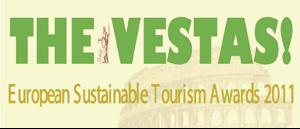Knowledge Networking Portal for Sustainable & Responsible Tourism










 Further details of the categories
Further details of the categories
| Contributor | Herbert Hamele |
|---|---|
| Country | global, |
| Keywords | Awards, |
| Release date | 02/07/2010 |
| # | Language | File name | Contributor | Upload date | Size | Content type |
|---|

The Most Sustainable/Responsible Award
The award will initially be based on four territorial areas in Europe: Coastal, Urban, Rural, Protected. As the categories overlap, you will need to select the type of area that best reflects the setting of the proposed entrant. In each area interested stakeholders can enter places, products or services in the following categories:
In total there will therefore be 20 categories in the main awards, with their sub-categories.
The Rusty Nail Award
In addition to the “best” awards a "rusty nail award" for destinations or enterprises who are clearly unsustainable will also be given, based on any of the categories. Entrants for the Rusty Nail Award can be nominated by anyone. However, they will not be published until an entry form is filled in that details the potentially unsustainable/irresponsible candidate and the issue in question.
The entry form will be based on the simple impact assessment form used by the European Commission. (See http://ec.europa.eu/governance/impact/commission_guidelines/docs/iag_2009_annex_en.pdf The Entry Form should have no more than 10 pages. It should a) present a description and summary of the problematic activity; b) present the analysis of the chain of responsibility; c) list the range of options identified and the options assessed in detail; d) present the main economic, social and environmental impacts. The entry form should use the following format:
The Country Contributing Most to “Peace through Tourism"
To demonstrate that the awards cover the issue of sustainability in depth, a special national award shall be given to ´the country contributing most to peace through tourism". Please read the DestINet peace though tourism section to see the focus of this issue and how it relates to sustainable tourism development. Please note the focus on the achievement of an Olympic Truce in 2012. This award will be taken to the World Summit on Sustainable Development follow-up in Brazil 2012.
How will the categories be judged?
The categories are designed to cover the key elements of the tourism supply chain. The VESTAS will award tourism businesses and destinations for their exemplary contribution to:
- maximize social and economic benefits to the local community and minimize negative impacts
- maximize benefits to cultural heritage and minimize negative impacts
- maximize benefits to the environment and minimize negative impacts
Entries will be judged by their contribution to the Global Sustainable Tourism Criteria. A panel of members of the ECOTRANS European network for sustainable tourism development will assess all entries for authentication. Those entrants who are authenticated will be profiled on DestiNet, where a minimum of 1000 experts across Europe will be invited to rate the applications, The highest ratings will then be presented to an international jury. The jury will make a final selection of a top three best practice examples based on the poll results.














































